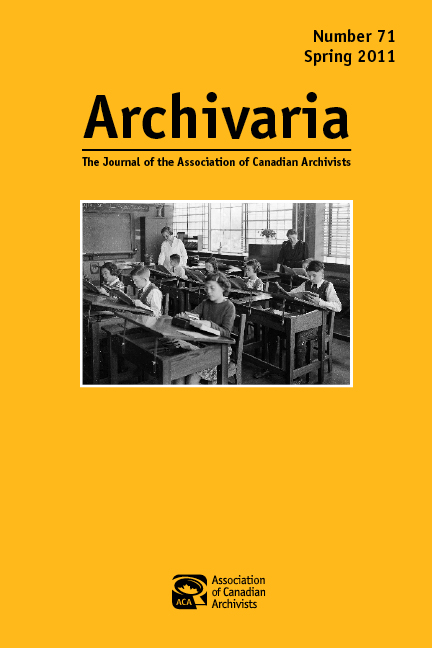Supporting Democratic Values Through a Relevant Documentary Foundation – An Evolutionary Complex
Abstract
The evolution of governance in democratic states as well as substantive changes within the administrative cultures of public administrations – and the development of enabling technologies – have constantly impacted and influenced the manner in which records have been managed within governments. Over the last capacity to manage records collectively as a society, and more precisely within government organizations, has not evolved at a corresponding pace to satisfy all of the new demands and expectations emerging both through transitions and transformations around the nature and context of democratic values, and by corollary pressures established through new and highly accessible information and communications technologies. History shows that not only have we been unable to adapt, but that we have also gradually lost sight of the purpose and rationale for recordkeeping itself. Through a comparison of the development of recordkeeping in the public administration contexts of Switzerland and Canada, this paper explores the means to regain our capacity to manage documents effectively in the civic interest. The paper also suggests a series of actions that would at the outset permit us to address both the technological progress and the demands of society vis-à-vis open government and other needs related to the functioning of contemporary democracy.
RÉSUMÉ
L’évolution de la gouvernance dans les États démocratiques, de même que les changements importants dans la culture administrative des administrations publiques – et le développement de technologies habilitantes – ont touché et influé considérablement la façon dont les documents d’archives ont été gérés au sein des gouvernements. Au cours du siècle dernier, la situation et les circonstances se sont transformées si rapidement que notre capacité de gérer les documents d’archives collectivement comme société, et plus précisément au sein des organisations gouvernementales, n’a pas évolué à la même vitesse pour satisfaire toutes les nouvelles demandes et attentes générées à la fois par les transitions et les transformations de la nature et du contexte des valeurs démocratiques, et par les contraintes résultant des technologies de la communication nouvelles et hautement accessibles. L’histoire montre que non seulement nous n’avons pas été capables de nous adapter, mais que nous avons aussi graduellement perdu de vue le but et les raisons mêmes de la gestion des documents. En comparant le développement de la gestion des documents dans le contexte des administrations publiques de la Suisse et du Canada, ce texte explore les moyens de reprendre notre capacité à gérer des documents d’archives de façon efficace, au service de l’intérêt civique. Ce texte suggère aussi une série d’actions qui nous permettraient d’emblée d’aborder à la fois le progrès technologique et les demandes de la société vis-à-vis un gouvernement ouvert, et les autres besoins liés au fonctionnement d’une démocratie contemporaine.
Authors of manuscripts accepted for publication retain copyright in their work. They are required to sign the Agreement on Authors' Rights and Responsibilities that permits Archivaria to publish and disseminate the work in print and electronically. In the same agreement, authors are required to confirm that "the material submitted for publication in Archivaria, both in its paper and electronic versions, including reproductions of other works (e.g. photographs, maps, etc.) does not infringe upon any existing copyright." Authors of manuscripts accepted for publication retain copyright in their work and are able to publish their articles in institutional repositories or elsewhere as long as the piece is posted after its original appearance on archivaria.ca. Any reproduction within one year following the date of this agreement requires the permission of the General Editor.





